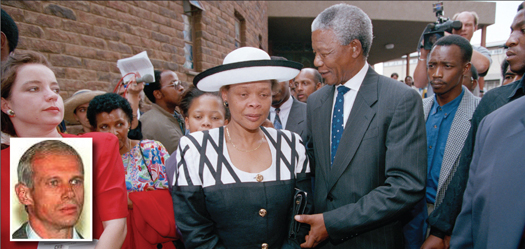GINNEWS

JOHANNESBURG (GIN)– The wife of a slain anti-apartheid hero is raging against a court decision ordering the release of her husband’s killer on parole within 14 days.
Limpho Hani, widow of Chris Hani, called the decision to grant parole to Janusz Walus “a sad day for South Africa.” She harshly rebuked the judge who made the ruling, calling her a racist.
In a radio interview, Mr. Hani’s widow told talk show host Redi Tlhabi that the presiding judge had no right to tell her to forgive the killer and move on.
Jack_KnifedSA tweeted this transcript of the interview: “How dare that White woman tell me to get over it? Is she God? Was her husband murdered?”
“I’m not upset‚ but highly irritated‚“ Mrs. Hani said.
At the time of his death, on April 10, 1993, Martin Thembisile Hani, was the leader of the South African Communist Party (SACP) and chief of staff of Umkhonto we Sizwe, the ANC’s armed wing.
He was shot at his Dawn Park‚ Boksburg‚ home. A neighbor alerted police which helped lead to quick arrests in the case that shocked the nation and almost derailed the handover to democracy.
Mr. Walus, a Polish immigrant, was said to have received the murder weapon from Clive Derby-Lewis, a Conservative Party MP and a “rabid racist” according to local reports. Both were sentenced to death‚ but their sentences were later commuted to life imprisonment when the death penalty was outlawed. Mr. Derby- Lewis was released last year on medical parole after a diagnosis of terminal lung cancer.
Lawyers representing Mr. Walus argued that he should be released on parole for the purposes of Ubuntu. A demonstration against the parole order is planned by the Gauteng ANC.
The ruling for parole opens a raw wound among South Africans and has triggered a wave of editorials for and against. Daily Maverick essayist Sisonke Msimang in a piece titled “The power of refusing to give,” wrote:
“Forgiveness plays an iconic role in our post-Apartheid national identity; those who forgive are revered as heroes of a special kind. More than any other trait, South Africans see forgiveness as part of the miracle of our transition to democracy.
“Women in particular are expected not only to forgive, but also to mother. …” But, she added, “the power of not forgiving, in a context in which forgiveness is expected, is that you force difficult conversations and you disrupt the status quo. The power in Limpho Hani’s anger is that it rages against forgetting. It insists on being heard and it solidifies his place in our collective memory.”
“In a plural democracy such as ours, one where so much time and energy has been put into forgiveness, the voices of the hurt and the outraged have a place too. Surely we can create space for the deep sadness that twenty years will not quell.”












